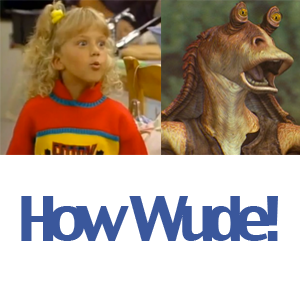Tweet
If you don’t not think too deeply about being unshallow, it’ opaquely clear. And as long as you follow Jedi recommendations to “Feel. Don’t think,” you won’t force this idea beyond transparency: Star Wars’ Force is a form of social media.
Here are a few reasons to imagine the Force as Forcebook.
- The Force is made up of midichlorians, which are basically Wi-Fi connections. The more midichlorians you have, the more bars or the better access you have to feel the Force.
- The Force has a search engine. You just have to tap into the midichlorians and “search your feelings.”
- The Force is a network of information.
- The Force can allow you to predict the future. It’s sort of tells you if clickbait or triggers are working through midichlorian analytics.
And I like imagining the Force as social media. Using the Force as a trope helps me appreciate the cool of digital social media. It helps me see some of the ways the Force really sucks.
- Yoda the Hutt
To use the Force, ya gotta be part of an elite club. You either have midiclorians or you don’t. Unlike with digital social media, you can’t really join the Jedi club through research and practice unless you’ve got midichlorians. There is NO such thing as
midichlorian toothpaste for helping strengthen your Force. Access to digital media is certainly an issue for a lot of people but tapping into the Interweb is much more accessible than being one or talking to one of the, like, thirty Jedi able to use the force and protect the galaxy.
- Force Bubble
The Jedi only use one search engine – the Force. Jedi Pariser makes a good point about digital media filter bubbles and how search engines are algorhetorical (algorithmic rhetoric) engines mediating the information we see and how users become shielded from alternative perspectives on issues: search engines game the information you see by providing results that reinforce your ideology or way of thinking rather than complicating and questioning it. Or you may just get results for some businesses and not others – Dark Side/Sith businesses rather than Jedi run establishments. The Force, though, is even worse. It is THE only search engine in the Galaxy. There is no Duck Duck Go or Bing or even Alta Vista, which is Yahoo!. It is as if there is just Google. There is only one bubble. And Jedi can’t even agree that they are feeling or seeing the same thing. Yoda might see something Obi-Wan doesn’t. And while it could be argued that such differences in Force use offer different or alternative perspectives, the perspectives are based on access to information. In other words, both Yoda and Obi-Wan can’t “read” the same “article” of the Force and compare notes or discuss the situation more completely. At least, I could say, “Yo,Yoda, Obi-Wan. Check out this article from Harlot about how Jar Jar Binks and Stephanie Tanner are similar. It argues that this might be a reason Jar Jar was so hated by fans. You know, because we were tired of Full House. Thoughts?”
“article” of the Force and compare notes or discuss the situation more completely. At least, I could say, “Yo,Yoda, Obi-Wan. Check out this article from Harlot about how Jar Jar Binks and Stephanie Tanner are similar. It argues that this might be a reason Jar Jar was so hated by fans. You know, because we were tired of Full House. Thoughts?”
- #kairos
The Force doesn’t even let users participate very easily in a #kairos economy: that change or the difference between that regular old kairos that the Jedi utilize and what we use in social media. #kairos happens when you are always connected to your midichlorians or are always on the web when you carry your smartphone. It is the omnipresent and omnispace – it’s the always on possibility of being able to have that agency for a propitious moment in a propitious digital space.But propitiousness can’t happen as easily with one network to tap into. The Jedi just don’t have a very good network for #kairos. Jedi Rheingold helps explains #kairos’ importance: “”In previous eras, it may have been true that ‘it’s not what you know but who you know.’ Today, how you know who you know matters as much as who you know, and one of the most valuable traits a person could have in a twenty-first-century organization is a knack for knowing ‘who knows who knows what’” (From @hrheingold‘s Netsmart 24). And to amend and add to his explanation, there is also a knack for knowing when to know when to know what and where to know where to know what. I hope here and now and know is a where to know what to know when to know what.I just Dr. Seussed or Yoda, did I? At any rate, the flows of information along numerous networks are opportunities for users to create value (informational, social, and emotional) in just right spaces and just right times. The Force limited these opportunities because of its limitations. Jedi had Forcebook. They didn’t have Twitter, Reddit, Pinterest, YouTube, or Yahoo! Pipes.
helps explains #kairos’ importance: “”In previous eras, it may have been true that ‘it’s not what you know but who you know.’ Today, how you know who you know matters as much as who you know, and one of the most valuable traits a person could have in a twenty-first-century organization is a knack for knowing ‘who knows who knows what’” (From @hrheingold‘s Netsmart 24). And to amend and add to his explanation, there is also a knack for knowing when to know when to know what and where to know where to know what. I hope here and now and know is a where to know what to know when to know what.I just Dr. Seussed or Yoda, did I? At any rate, the flows of information along numerous networks are opportunities for users to create value (informational, social, and emotional) in just right spaces and just right times. The Force limited these opportunities because of its limitations. Jedi had Forcebook. They didn’t have Twitter, Reddit, Pinterest, YouTube, or Yahoo! Pipes.
In more, other, and our words, Jedi, it’s time to “Think. Don’t feel.” Forget the Force. May the #kairos be with you.
This is an excerpt from an article I’m writing with @CateBlouke.
